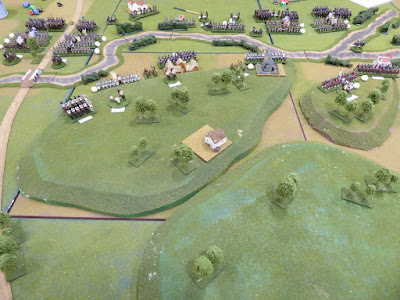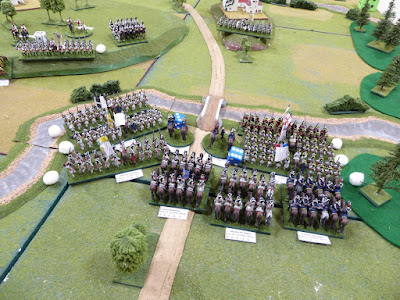Having led the Piedmontese and Austrian armies to ignominious defeat last week to Matt (see There Was Such Great Promise) including the loss of King Emanuele III, I took to the field again. This time, my Piedmontese/Austrian army would face Peter (see A Remote Wargame - Battle of Bassignana) on the fields of Bassignana.
Would I meet the same fate?
As a reminder, army dispositions and battlefield are illustrated in the photo below:
 |
| Initial dispositions |
In all previous battles, the Piedmontese positions as Chiesa de San Germano and Montecastelle stood firm. No French attacks could dislodge the defenders. With little progess by the French against these fortified positions, I figured them to be relatively secure. So secure, in fact, that the defenders tore great swaths out of the French as they attacked up hill. Unfortunately, there was no reserve at hand with which to capitalize on this success.
The dragoons, under Liguane, maneuvered in my game with Matt to always be nowhere rather than somewhere. They were marched along the road to the north in support of Bassignana. Liguane never reached Bassignana before the battle was decided. This time, Liguane would maintain his position on the right flank to take advantage of any opportunities that might arise.
De la Chiesa's position at Rivarone looked too exposed to me. As a salient, he may have slowed the attacks but his position and his brigade were eventually overrun. I needed to try a different approach here.
Let's see if any of this worked against my Australian opponent.
 |
| Defenders of Montecastelle. |
 |
| The defenders face tough odds. |
 |
| D'Aix' elites hold the Piedmontese right. |
 |
| The defenders of Rivarone at the ready. Note: Red discs denote On Reserve. |
 |
| de Gage's Spanish |
 |
| de Gage's Spanish begin the crossing |
 |
| as Arambou intends to cross the Tanaro at the bend heading toward Rivarone. De la Chiesa's brigade abandons Rivarone taking up position on the heights. |
 |
| Following a very successful bombardment of Montecastelle by de Montal's heavy battery, Senneterre attacks! The Piedmontese defenders disperse. |
 |
| Montecastelle falls! |
 |
| To Senneterre's left, de Grammont splashes across the Tanaro. He is met by Liguane's dragoons. |
 |
| The Spanish cross the Tanaro River and meet light resistance. |
 |
| With Montecastelle in French hands and Rivarone empty, de Montal advances upon Rivarone. |
 |
| Seeing Rivarone occupied by the French, Arambou attacks the enemy on the heights. |
 |
| De Montal pushes through Rivarone and attacks the militia above the village |
 |
| while Arambou pushes the enemy infantry back in a powerful attack. |
 |
| Having driven off D'Aix's guns to the east of Montecastelle, Senneterre turns attention against the Piedmontese Guard. |
 |
| In support, de Grammont's infantry form up and pour volleys in the church at San Germano. Note: de Grammont has driven off Liguane's Dragoons. |
 |
| While the firefight continues at Montecastelle, Senneterre's cavalry overrun the guns before they could deploy. |
 |
| De Gage with support from Arambou, begins his attack on Bassignana. Both sides suffer heavy casualties. |
 |
| Arambou clears the heigths of enemy. De la Chiesa' Brigade breaks. King Emanuele III just manages to escape. |
 |
| With the heights in enemy hands and his army split, King Emanuele III plots his escape. |
 |
| Battle lines at end. |


Another fun account Jonathan. These results do appear to have the weight of history on their side, apart from that one outlier (from memory).
ReplyDeleteThanks, Lawrence! I need to go back and read how the Piedmontese pulled out a victory in Game #2. You have a good memory!
DeleteThe Piedmontese with no reserves were always going to struggle with any setback (poor dice rolls). Gaming free format without grids worked surprisingly well.
ReplyDeleteThe Piemontese are in a tough situation (as they were historically) unless Schulenberg's Austrians make a timely appearance.
DeleteNo grid worked well, I thought! The situation is eased by not having players require precision movement from the umpire. I always try to manuever units in the best interest of the owning player.
Interestingly Peter still thought the investment in Montecastelle worthwhile and that paid off this time - was that a surprise?
ReplyDeletePerhaps Peter did not read the previous battle reports or he wanted to pin D'Aix's brigade to Montecastelle and Chiesa de San Germano so that Montal and de Gages could tear through the center?
DeleteThis does seem like a rather hard game for the Piedmontese to prevail in - not sure how they did it in game two - perhaps some above average luck with the dice?
ReplyDeleteIt is tough for the Piedmontese, for sure, but their historical situation was no different. In Game #2, King Emanuele redeployed Liguane from the far right to Bassignana and Schulenberg's Austrians arrived over the Po in the nick of time.
DeleteThere was some very good shooting by the Piedmontese too. The French were shot to pieces at Montecastelle and Chiesa de San Germano. De Gages suffered too.
Excellent game, especially in three hours.
ReplyDeleteThank you! Three hours to completion is a respectable clip given at least 40 BMUs on the table.
DeleteGreat looking game as always sir!
ReplyDeleteThank you, Michal!
DeleteAnother superb account. The Piedmontese are always up against it. Relying on the Austrians to get to the field on time
ReplyDeleteGlad you enjoyedf the report out! Yes, the Piedmontese are in a tight spot. If the Austrians do not cross the Po in a timely fashion they are in trouble.
DeleteWell played again Jon , I guess it would appear the numbers count in the end. It makes for a great battle. What would be so interesting from a wargame perspective would be to see if the King could escape with his force across the Po intact rather than stand and fight. This would completely change the victory conditions but might best be played as a solo outing ?
ReplyDeleteA fighting withdrawal certainly makes for an intruiging option Matt.
DeleteMatt, I would say better played by Peter! He saw great success on the battlefield this day.
DeleteIf the battle is of an attritional nature, the larger army definitely holds an advantage. My Piedmontese failed to hold the key points long enough to delay the enemy and allow the austrians to come to save the day.
A fighting withdrawal would be an interesting twist to the scenario but would it really be refighting the historical battle? You are correct in that victory conditions would need to be modified. This is a good idea to amend the scenario and give it a try sometime.
Another great game and one that confirms the historical outcome, in a sense 'proving' it wasn't a fluke. It would be interesting to see what might happen if the Austrians actually arrived to influence the battle towards the end. Would the Attackers have enough forces to confront both sets of Defenders?
ReplyDeleteThanks, Steve! As it stands, the historical outcome is 3-1. In Game #2, cagey play by the Piedmontese and an on-time arrival of Schulenburg's Austrians allowed a victory for the King. In that game, the attackers were worn down by time they reached Bassignana and the austrians counterattacked.
DeleteAnother great report on this battle Jonathan. I do like Steve's suggestions about a fighting withdrawal or an Ausyrian arrival.
ReplyDeleteGlad you liked the battle account, Richard! A fighting withdrawal would be interesting to play. How would you set the Victory Conditions such that the Piedmontese did not run when the first shots were fired?
DeleteWith FPW where the French have a difficult time of things most of the time, I have victory points for the Prussians for taking an objective by a certain game turn. However, the French get increasing points for every turn they hold the position thereafter. It means that the French can't just run. They need to delay as well.
DeleteGood! I have used similar criteria in other games.
DeleteA grand read and game Jonathan, I do like these rerun games. I have tried similar with different rule sets per game but not with the same rules in play.
ReplyDeleteThanks so much, Phil! I enjoy enjoy refighting historical battles. One more playing of this one coming up next week before I strike the tent.
DeleteI like the scale and spectacle of your table - impressive.
ReplyDeleteMuch appreciated, GW! Great to see a new reader taking the time to leave a comment. Thank you!
DeleteGreat looking game as always it seems the gaming system generally delivers a historical result which is good, you were certainly up against it!
ReplyDeleteBest Iain
Thanks, Iain! If the game system can produce plausible results, I am satisfied. Having the capability to reproduce the historical result is always a bonus. Seeing the historical outcome reproduced in multiple trials lends some insight and validation into the historical encounter.
DeleteWell the winning or losing doesn’t matter as all the good games you are getting in! And really getting the best gaming out of the scenario. The visual of the game continues to impress. The side you’re playing seems to have a hard objective. When you achieve it it’ll be more sweet. 😀
ReplyDeleteStew, we are getting in a number of good games with this scenario. It is fun to see different players attack the problem in different ways although with repeated trials, tendencies begin to emerge. Something not possible to develop in one-off games.
DeleteTough for the Piedmontese, for sure, but the historical situation the King found himself in was no less difficult.
You are right. Winning or losing does not so much matter when you share a table with like-minded, historical wargamers who are as intrested in the history as in the game.
At the risk of echoing some of the above comments, it seems to me that the Austrians ultimately hold the key for a Piedmontese victory. No Austrians, no party for King Emmanuele……
ReplyDeleteAfter seeing the battle fought four times, I will agree. If the Austrians follow history and fail to show then the King has a tough job. If the austrians show up in a timely manner, the tables can be turned.
DeleteNo Austrians, no party , I like that!
Perhaps in Monday's game I will allow the Austrians to begin rolling for entry one turn early??? Still, I want the Piedmontese to be pressed really hard and try to cling on before a save by the Austrians.
Your opponents have done well, but you have also been generous in taking the side that lost historically. Will you do so again in the next one?
ReplyDeleteRegards, James
In the next (and last) Bassignana game, I will be umpiring only.
DeleteInteresting to see the different approaches to the situation, and a s a game, it certainly looks like there has to be at least a chance of an earlier Austrian arrival!
ReplyDeleteIt is interesting, isn’t it? There a is a chance for the Austrians to arrive early. That chance increases as the game progresses.
DeleteA great game and enjoyable commentary Jonathan!
ReplyDeleteChristopher
Thanks! Oftentimes, reader commentary is the best part!
Delete